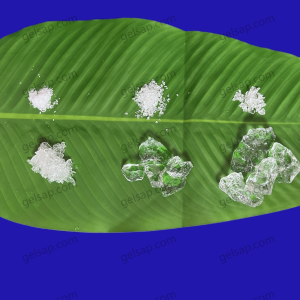Potassium polyacrylate is a super absorbent polymer often used in agriculture for water retention in soil. Given its widespread application, it’s important to address common questions about its environmental impact, natural origins, and safety. This article explores these aspects to provide a comprehensive understanding.

Is Potassium Polyacrylate Harmful to the Environment?
Potassium polyacrylate itself is not inherently harmful to the environment, but its impact depends on how it is used and disposed of.
- Degradation: Potassium polyacrylate is not biodegradable. It does not break down quickly in the environment and can persist for many years before degrading through natural processes such as exposure to light and weather conditions.
- Water and Soil Contamination: Improper disposal can lead to pollution of water bodies and soil. Although it is non-toxic, large quantities can disrupt natural ecosystems and soil structure.
- Recycling and Disposal: Proper disposal and recycling are crucial to minimize environmental harm. Products containing potassium polyacrylate should be disposed of according to local regulations to prevent contamination.
Is Potassium Polyacrylate Natural?
No, potassium polyacrylate is not a natural substance. It is a synthetic polymer produced through industrial chemical processes.
- Chemical Composition: Potassium polyacrylate is composed of long chains of acrylate compounds, which are derived from petroleum-based sources.
- Manufacturing Process: The production involves polymerization, a chemical reaction that links acrylate monomers into large, repeating chains, resulting in the super absorbent properties of the polymer.
Is Potassium Polyacrylate Safe?
Potassium polyacrylate is generally considered safe for use in various applications, but some precautions are necessary.
- Non-Toxic: It is non-toxic and poses no significant health risks when used as intended. Its non-toxic nature makes it suitable for agricultural applications.
- Inhalation and Skin Contact: While direct skin contact is generally safe, inhaling the powder form can irritate the respiratory system. Prolonged skin exposure to large amounts may cause irritation.
- Food Safety: Potassium polyacrylate is not approved for use in food products due to potential health risks if ingested.
Is Potassium Polyacrylate Safe for Plants?
Potassium polyacrylate is often used in agriculture for its water retention properties, and it can be beneficial for plants when used correctly.
- Water Retention: It significantly enhances soil’s water retention capacity, making it useful in agricultural and horticultural applications, especially in arid regions. This helps maintain soil moisture, promoting healthy plant growth and reducing the need for frequent watering.
- Soil Structure: By retaining water, potassium polyacrylate helps keep soil moist for longer periods, which supports plant root development and overall health.
- Concentration and Usage: Overuse can lead to overly saturated soil, which might hinder air flow and negatively impact plant roots. It’s crucial to use the appropriate amounts to avoid such issues and ensure optimal plant growth.
Conclusion
Potassium polyacrylate is a versatile polymer offering significant benefits in agricultural applications due to its water retention capabilities. While it is safe and non-toxic when used properly, its synthetic nature means it is not biodegradable and requires responsible handling and disposal. By following proper disposal methods and adhering to recommended usage guidelines, potassium polyacrylate can be effectively used to support plant growth without causing environmental harm.
Understanding these aspects helps in making informed decisions about using and disposing of potassium polyacrylate, ensuring safety for both the environment and human health. For proper disposal methods, consult with appropriate waste management services.

